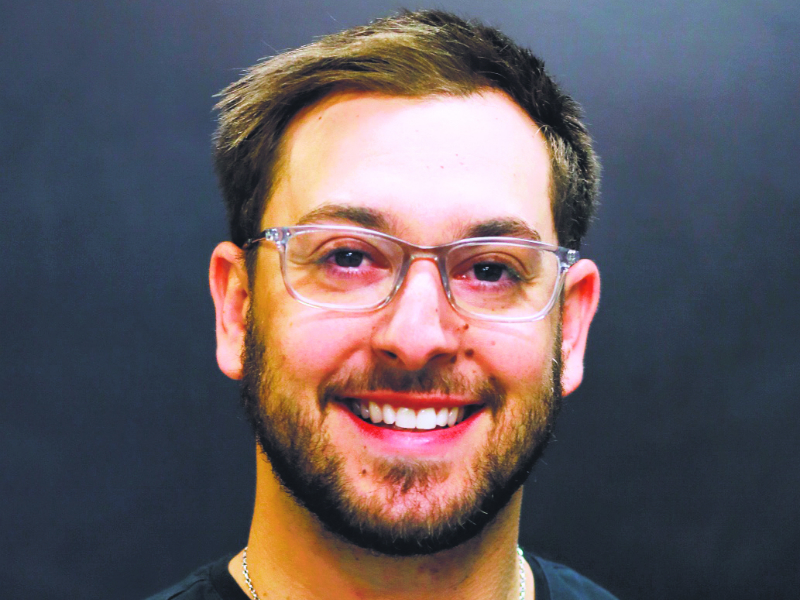An Ottawa man’s dogged research into his past may now lead to a revision of his family’s history.
Last summer, Gabriel Wolinsky travelled from Ottawa to Toronto to attend a family reunion. Everyone present received a privately published family history, Sprechers By Any Other Name, by David Sprecher. The author’s father and Wolinsky’s grandfather were brothers.
Wolinsky had done some basic research on his German-born grandfather’s fate during the Holocaust – he had found a passport and some old documents. But his grandfather, Arnold Sprecher, “never talked about it,” Wolinsky recalled. “It was too hard for him. He lost a lot of family.”
The published history rekindled Wolinsky’s interest in the subject, but he felt it had gaps. His grandfather had lost his father, brother, sister, nephew and sister-in-law. “No one really knew what happened to them,” Wolinsky said. “We just knew that they were gone. No dates, no locations.”
He wanted to know more, so the 32-year-old co-owner of two Ottawa-area dance studios hit the Internet, and he now wants everyone to know that information about the Holocaust available online is so detailed, it can surprise even a tech-savvy, young person.
Because the Nazis were fanatical record-keepers, and thanks to new, constantly updated archives and databases, “there’s just a ton of information now to be found,” he said.
Wolinsky started by gathering basic data – names and birth dates – about his relatives, and then did some “crazy cross-referencing” online. He discovered an extensive German government archive, bundesarchiv.de.
The site revealed that his family members had been aboard a transport train that departed Cologne, Germany, on July 20, 1942, and arrived four days later at Maly Trostenets, a Nazi extermination camp near Minsk, in today’s Belarus.
“It told me something we had never known before,” Wolinsky said with excitement. His grandfather had believed that his loved ones simply may have been shot in the street in Cologne.
Using the transport data, Wolinsky then consulted the website of Yad Vashem, Israel’s Holocaust memorial, whose database is legendary. Within it, there’s a searchable page called Transports to Extinction, which lists every train that shuttled Jews to their deaths during the Holocaust.
Wolinsky entered the date and place of the train’s departure, and the results were granular. They showed where the passengers were told to assemble in Cologne, the station from which the train departed, the number of passengers (1,164), the stops it made en route – even the train’s number (219).
Wolinsky learned that on arrival, all but a few of the passengers were shot into pits. His great-uncle Jacob was selected as a labourer, while Jacob’s wife and teenaged son were murdered right away. Jacob met the same fate on Oct. 21, 1942.
As for his grandfather, Wolinsky knew only that he had been interned at Dachau following Kristallnacht. Online searches unearthed Arnold Sprecher’s registration document, issued on arrival on Nov. 30, 1938, and his prisoner number, 31306.
An email exchange with an official at Dachau’s museum revealed that Sprecher was imprisoned at the camp until Feb. 11, 1939, before securing his release by agreeing to leave the country permanently.
He then arranged passage to Britain and arrived in Canada in 1940, going on to become a successful tailor in Montreal. Sprecher died in 2006, one day before his 93rd birthday. He never knew what had become of his family members.
READ: CANADIAN LAWYER FIGHTS TO RESTORE UKRAINIAN MASS GRAVE
Wolinsky has enjoyed the research. “I love finding out information,” he said. “It’s not fun information, but it’s part of our history.”
Along with consulting a German historian, he estimates he searched 15 websites, three archives and a museum database. His online sleuthing was “mind-blowing.”
“My grandfather never knew any of this. It’s proof they were there. That’s what I was looking for. And then it’s real.”
Wolinsky’s advice, even for the technically adept is straightforward. “All you need is a simple thing: someone’s name. Getting tiny bits of information can lead to a huge find if you are searching the right site or getting in touch through email with the right person.”
As for the family history Wolinsky first read last summer, it may now be refreshed to incorporate his findings.
The volume’s author, David Sprecher, an 88-year-old retired mathematics professor who lives in New York, called his young relative’s research “remarkable.” He added: “I proposed to Gabriel that we combine forces to write jointly an updated history.”
Wolinsky said his saga “has renewed a fire within me to know our past, never forget our family and strengthen our resolve for the future.”
For children and grandchildren of Holocaust survivors, “this can be a very fulfilling endeavour that takes time and patience. But it is worth the effort.
“I would love to do it for other people. I don’t mind doing this because I think it’s very important.”
